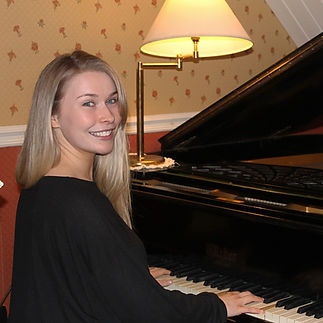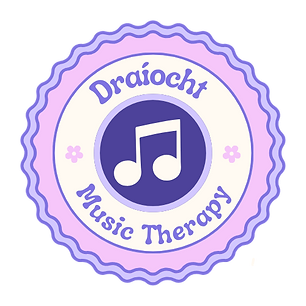
Draíocht Music Therapy
Whether you're seeking support for yourself, your child, or a teenager, Draíocht Music Therapy offers professional, accredited care.
Get in touch by phone or fill out the contact form, and I’ll respond within two working days during business hours.
0861017464


Katie Cody
Katie is a qualified music therapist, bassoonist, and pianist from Co. Kildare. She began her musical studies in the Newbridge School of Music and St. Angela’s Academy of Music. She was the recipient of the David Moloney Medal and Sr. Ursula Memorial Award from the Ursuline Secondary School, Thurles in 2014.
She received a First Class Honours degree in Music from the Cork School of Music in 2018 under the tuition of Emma Neal. After 5 years of service as an instrumentalist in the Defence Forces School of Music she undertook her Masters degree in Music Therapy in the University of Limerick. She also holds a Postgraduate Certificate in Sexual Wellness and Sexuality Education From DCU, where she focused on the impact of puberty, sexuality, and gender identity on teenage mental health.
She has 10 years of experience working in educational environments. Most recently she completed placements in St. Joseph’s School for Children with Visual Impairment, Drumcondra, the National Rehabilitation Hospital, Dun Laoghaire, and Thomastown NS, Tipperary. She has worked as a tutor for Malvern Winds, a senior teacher in the Glasgow Piano Teachers, the High School of Glasgow, Haydock Music, Bellvue Academy in Clonmel, and most recently, as a piano and double reed teacher in St. Angela’s Academy, Thurles.
Katie is an in-demand bassoonist and contrabassoonist and has enjoyed a varied career playing on a national and international level with the RTÉ National Symphony Orchestra, Esker Festival Orchestra, the Irish Film Philharmonic, Sinfonua, the Zephyrus Wind Quintet, the RIAM Wind Quintet and the Cork Concert Orchestra. She was the winner of the Feis Maitiu Senior Woodwind Crowley Perpetual Cup in 2018.
Outside of music, Katie is an avid reader, sea-swimmer, and baker.




What is music therapy?
Music therapy is an evidence-based practice that uses music to support emotional, social, and cognitive well-being. Through playing, singing, or listening to music, a trained therapist helps individuals express themselves, reduce stress, improve communication, address social needs, and contribute positively to their overall wellbeing. (Wigram & Gold, 2009;American Music Therapy Association)
In Ireland, a music therapist is trained to a Master’s degree level and is accredited through IACAT (Irish Association of Creative Arts Therapies).
Click here to read more about music therapy and IACAT.
Who does it benefit?
The short answer is that almost anyone can benefit from music therapy.
It can support emotional regulation and mental health concerns (e.g. anxiety, depression, trauma). It enhances self-expression and communication, especially for clients who find verbal expression difficult. It builds social skills, self-esteem, and confidence. It can support students with additional needs (e.g. ASD, ADHD, learning difficulties).
Music therapy provides a safe, non-invasive creative outlet for stress and emotional processing. No previous musical knowledge is required. (Carpente & LaGasse, 2015)
What does a session look like?
Sessions usually last from 30 to 60 minutes. Sessions are bespoke and tailored to the client and are person-centred and humanistic. They can be individual or group sessions, depending on the goals and context. Sessions can include:
-
Listening to music
-
Playing instruments
-
Singing
-
Songwriting & improvisation
-
Playlist creation
Music therapy is not a teaching space. Rather than focusing on musical skills or performance, it is a therapeutic process where music is used as a medium for communication, healing, and emotional growth. It can complement other therapeutic approaches such as counselling or psychotherapy.
In music therapy, there is no right or wrong way to create music.